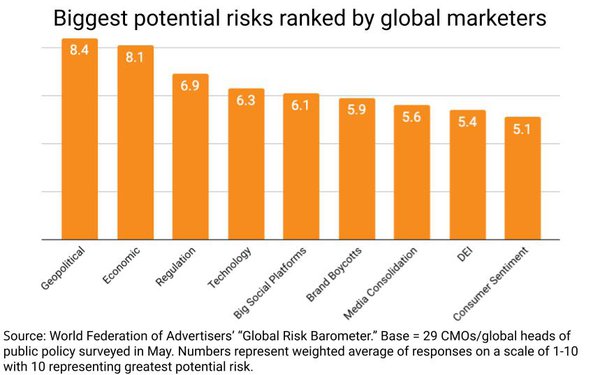
Less than a year after the World Federation of Advertisers (WFA)
shuttered its Global Alliance for Responsible Media (GARM) initiative after being sued for antitrust by
Elon Musk, some of the global ad trade association's most influential members believe the current geopolitical environment, the "policies and practices of big social media platforms," and "changes
in DEI policies and practices" are among their greatest potential risks.
Hmmm, I wonder who they're worried about.
Or, as one verbatim response from an anonymous respondent to the
WFA's 2025 "Global Risk Barometer" put it: "“DEI, geopolitical - definitely more risk, in the U.S. especially. But the economic pressures force brands to keep their heads down and just scramble
to execute.”
advertisement
advertisement
“The geopolitical risks are having a domino effect on the various actors and decision-makers who act on our products, communications, and advocacy - leading to a more
restrictive, overreactive, knee-jerk reaction to punitive action rather than collaboration and continuous improvement," says another, adding, "It makes for a much difficult system to navigate in the
absence of stability.”
While the study doesn't exactly name names, we can all infer who they're talking about: radicalized right-wing, anti-woke, anti-DEI, anti-free speech -- heck,
anti-everything-in-the-free-world-of-consumer-marketing, if I might add -- agenda being pushed by a certain U.S. executive branch, its cronies in Congress, its "allies" overseas, and the capitulating
Big Media platforms that have been aiding-and-abetting, and sometimes suing.
I could drill down into all the nuances of the barometer's findings, but you should read about it for yourself here.
For now, I'd just like to focus on the DEI part, because I've been
thinking about it ever since my colleague Sarah Mahoney published her "Quiet
DEI" column back in March. It was one of the most important pieces since, if I may quote Mark Zuckerberg, the "cultural tipping point" manifested after Trump 2.0's
election.
But has it, really?
Clearly not among global marketers, who while they may have put it under the radar for now, are still actively pursuing their DEI agendas -- not because
just because it's the right thing. Or as P&G brand chief Marc Pritchard might
say, "Doing well, but doing good." In other words, because DEI initiative are an integral part of effective marketing in an industry based on serving the needs of a diverse array of global
consumers.
How in the world did this ever get politicized?
Anyway, I've noticed a recent trend toward what I'd call "less-than-quiet-DEI," and two of them emerged this week.
One is the WFA's new risk barometer, which calls it out explicitly.
Another was Havas Media Network's announcement Tuesday about yet another in its succession of
"meaningful" equity media marketplaces, this one addressing the health needs of of under-served and diverse communities.
Like P&G's Pritchard and I'm sure many of the CMOs responding to
the WFA's recent survey, they're not just doing it because it's the right thing for society, but because it's the right thing for their bottom lines.
That said, I was surprised that Havas
Media Network is taking yet another visible stand in the current geopolitical climate, so I asked about that explicitly.
"Inclusive media planning isn’t just the right thing to do,
it’s part of the lens we bring to everything we build," responded Director of Marketing & Communications Lauren Beneventano, adding, "We build media solutions that drive business growth and
meaningful progress. Our marketplace initiatives, developed with clients committed to inclusive, authentic outreach, reflect our belief that purposeful media can deliver both results and impact. The
Health Equity Marketplace addresses a key gap in healthcare marketing, reaching underserved patients with data-driven, transparent, and effective strategies. It helps brands improve access,
relevance, and outcomes in overlooked communities, building trust and long-term value."